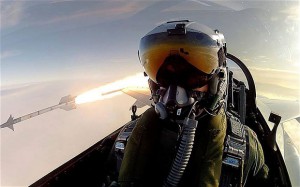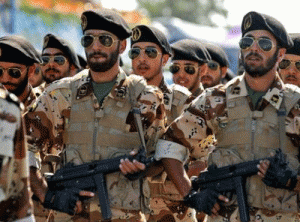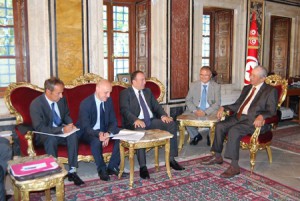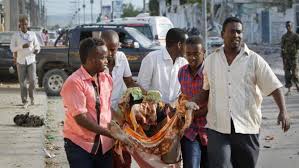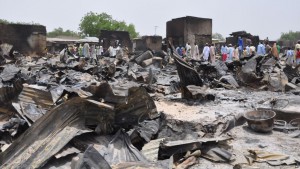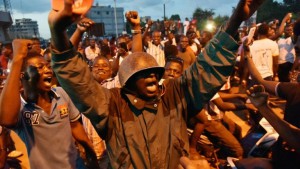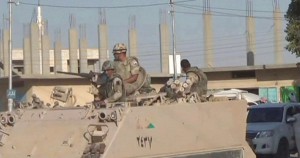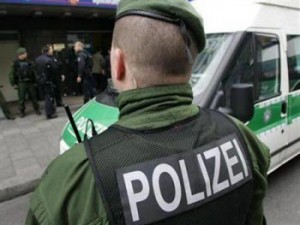Iran’s president claims his military best defense against Islamic State
The Iranian president says his country’s military is the most reliable force to take on “terrorists in the region” – a reference to the extremist Islamic State group.
Hassan Rouhani says Iranian troops are willing to help both Iraq and Syria in the struggle against IS militants, but insisted Tehran has no military intentions toward other nations.
Rouhani’s speech at an annual parade Tuesday in Tehran was broadcast live on state TV.
He says that if the “terrorists begin to expand in the region, the only hope will be Iran’s army and the Revolutionary Guards.”
Rouhani said Mideast nations should not put too much faith in “Western powers as their defenders.”
Iran has already sent military advisers to both Iraq and Syria to help in the battle with IS militants.
Europe asks Tunisia to sign protocol to criminalise foreign terrorist fighters
Europe has asked Tunisia to sign an additional protocol to the Convention on the Prevention of Terrorism that criminalises foreign terrorist fighters.
Europe’s call was conveyed by Chairman of the Committee of Ministers at the Council of Europe Igor Crnadak at a meeting Monday in Bardo with Speaker of the House of People’s Representatives (HPR) Mohamed Ennaceur.
“The signing of the additional protocol to criminalise foreign terrorist fighters will help expand co-operation in the fight against the danger of terrorism,” noted Crnadak who is visiting Tunisia from September 20 to 22.
“Tunisia’s security and stability directly impacts the situation in European countries since terrorism targets values and foundations shared by both sides,” Mr. Ennaceur was quoted as saying in a HPR press release.
Tunisia recently adopted a new law on the fight against terrorism and money laundering.
The Security Council had discussed last May a resolution on the growing threat of foreign terrorist fighters, of whom 25 thousand, from one hundred countries, have joined the main hotbeds of tension in Afghanistan, Iraq, Libya and Syria.
Al Shabab: suicide car bomber targets Somalia’s presidential palace
An Islamic extremist suicide bomber detonated an explosives-laden vehicle at the gate of the Somalia’s presidential palace in the capital, killing at least four people, a police official said.
The bomber rammed his vehicle near soldiers guarding the Mogadishu compound that is the official residence of the president, prime minister and the speaker of Parliament, Capt. Mohamed Hussein told The Associated Press by phone.
The bomber appeared to target foreign officials who were leaving the presidential palace, killing two of them, he said. He did not identify the nationality of the officials. At least two soldiers also died in the blast, he added.
Huge smoke could be seen billowing over the scene of the blast and soldiers fired into the air to disperse the crowd who gathered around, according to witness Abdirahman Mohamed, who lives near the presidential palace. Ambulances rushed to the scene to transport the blast victims to hospitals.
The Somali Islamic extremist group al-Shabab, which has ties with al-Qaida, claimed responsibility for the attack in a message broadcast over its online radio Andalus.
The message said the attack targeted “senior apostate leaders and Christian foreign invaders.”
Despite being forced out of many of their strongholds, al-Shabab fighters are still able to launch lethal attacks in Mogadishu and elsewhere in Somalia, often targeting African Union troops and government officials.
The attack comes as Somalia’s regional and national leaders are holding consultative meetings focusing on presidential elections scheduled for next year.
Boko Haram: 80 people killed in bomb blasts in Nigeria’s Borno state
At least 80 people were killed and about 150 injured in multiple bomb attacks in northeastern Nigeria’s Borno state on Sunday evening, police and witnesses said on Monday, reports Reuters.
The state is the birthplace of the insurgency waged by Boko Haram and has been the focus of attacks by suspected members of the militant Islamist group that have killed more than 800 people since President Muhammadu Buhari took office on May 29.
Three bomb blasts in the state capital Maiduguri around 7:30 p.m. (1830 GMT) left at least 54 people dead and 90 injured. Around two hours later, two bombs exploded at a checkpoint some 135 km away at a market in the town of Monguno.
Locals residents and a hospital source said that attack killed 27 people and injured 62 others.
No one has claimed responsibility for the attacks but they bore the hallmarks of the jihadi sect, which has been trying to carve out a state in the northeast of Africa’s most populous country since 2009.
The Boko Haram insurgency has killed thousands and displaced 2.1 million people. Buhari’s March election victory owed much to his vow to defeat the insurgents, but there was a spike in attacks across northern Nigeria in the two months following his inauguration and Maiduguri was hit on a near weekly basis.
A new offensive launched by the Nigerian army to clear Boko Haram out of more towns over the last month has led to a sharp drop in the frequency of attacks in Borno, the worst affected by the insurrection, and neighboring states.
Maiduguri has been free of attacks for about a month. It was last hit by a bomb at the end of July and there was a skirmish with suspected Boko Haram militants on the outskirts of the city in mid-August.
Burkina army enters capital as coup leaders free president and negotiate surrender
Burkina Faso army troops have entered the capital Ouagadougou without resistance and begun negotiating the surrender of coup leaders, police said early Tuesday as France’s ambassador tweeted that the interim president had been released.
“All units (of the army mobilised on Monday to march on the capital) reached Ouagadougou” overnight, Colonel Serge Alain Ouedraogo, deputy head of the Burkinabe police, told AFP.
“We must now secure the surrender of the (coup leaders) without gunfire or bloodshed,” he said.
He spoke after French ambassador Gilles Thibault tweeted that interim president Michel Kafando, who had been under house arrest, was now “at the French residence”.
Kafando had been arrested on Wednesday as Burkina was plunged into turmoil when soldiers from the powerful presidential guard regiment loyal to ex-leader Blaise Compaore detained him and prime minister Isaac Zida, himself a former deputy commander of the unit.
The RSP, an elite unit of 1,300 men, officially declared a coup the following day and installed General Gilbert Diendere, a close Compaore ally, as the country’s new leader.
At least 10 people were killed and more than 100 injured in protests sparked by the coup, which came just weeks before what would have been the first elections since Compaore was ousted in a popular revolt last October after trying to extend his 27-year grip on power.
Burkina Faso’s army chiefs on Monday ordered coup leaders to lay down their arms as troops began marching from the provinces towards the capital Ouagadougou.
“All the national armed forces are converging on Ouagadougou with the sole aim of disarming the presidential guard (RSP) without any bloodshed,” an army statement said.
It advised members of the RSP to go to the Sangoule Lamizana military barracks west of the capital, saying they and their families would remain safe.
The stark warnings came as anger grew over a west African-mediated peace deal to end the latest crisis in the landlocked former French colony.
Witnesses said the military units were greeted along their march to the capital by crowds of people cheering.
French President Francois Hollande also demanded “all those involved in the putsch to immediately lay down their arms and hand over power to the legitimate authorities—or face the consequences.”
And he warned that France, which still wields significant influence in its former African colonies, could also “apply sanctions to those opposing the holding of regular elections”.
A similar call was also issued by the presidents of Niger and Chad, who called on the renegade soldiers to “return to the barracks” and hand back power to the transition administration they toppled on September 17.
‘Serious reservations’
Following the coup, Senegal’s President Macky Sall, the rotating head of the Economic Community of West African States (ECOWAS), undertook three days of mediation and on Sunday came up with a 12-point plan to end the crisis.
The ECOWAS deal provides for presidential and parliamentary elections to be held by November 22 at the latest, and crucially would allow for pro-Compaore candidates to take part after they complained about being excluded from October’s vote.
ECOWAS mediators said the fate of the RSP should be decided by a future Burkinabe leader.
And they have also proposed an amnesty for those behind the coup—a suggestion that has sparked widespread anger on the streets.
Diendere on Monday had said he would honour the ECOWAS proposal and hand over power.
But Kafando told France’s RFI radio he had “serious reservations” about the ECOWAS peace deal and was sceptical that any solution to the crisis would be achieved during the Abuja summit on Tuesday.
He said he had not been invited to attend.
‘Shameful’ amnesty proposal
In Ouagadougou, residents were highly critical of the ECOWAS proposal and furious at the suggestion of amnesty for the presidential guards.
“We don’t trust ECOWAS any more. We want to get out there and take our destiny in our hands,” said Adama Traore, an office worker in his 30s.
“The bodies are not even buried and (they want) an amnesty. We shall barricade everything,” he said.
Civil society activists who played a major role in the uprising that toppled Compaore have also condemned the ECOWAS proposals, with the main “Balai Citoyen” (Civic Broom) group branding the deal “shameful”.
“We cannot accept the amnesty. There are comrades who have fallen and ECOWAS is telling us to extend an amnesty,” said Mady Ouedraogo, a spokesman for Balai Citoyen.
Although the streets of the capital were filled with traffic and many shops were open on Monday, Internet access was barely available and several mobile phone networks were not working.
Many of last year’s demonstrations against Compaore were organised through social media.
mgafrica.com
Egyptian army kills 19 militants in Western Desert, Sinai
The Egyptian security forces killed 19 militants on Monday during massive raids in the Western Desert and the restive Sinai peninsula, the Egyptian military spokesman said.
Brigadier-general Mohamed Samir pointed out that 10 militants were killed and one was injured and arrested in the Bahariya Oasis region in the Western Desert and nine others were killed on the 15th day of a large-scale anti-terror campaign in North Sinai province.
“The forces managed to eradicate a highly-dangerous armed terrorist cell in the Bahariya Oasis region that plotted to carry out attacks during the upcoming Muslim Sacrifice Feast,” the military spokesman said in the statement.
A few days earlier, the Egyptian security forces killed 12 people including eight Mexican tourists by mistake while chasing militants with similar 4×4 vehicles near Bahariya Oasis in the country’s Western Desert.
In North Sinai, the forces arrested 17 suspects, destroyed 25 hideouts, 28 huts and dens, 14 motorbikes and seven vehicles belonging to the militants.
Monday’s raids in Sinai mark the 15th day of a large anti-terrorism operation that left hundreds of militants killed and a similar number of suspects arrested.
Last week, a police general was shot dead by unknown militants riding a vehicle and a soldier was also killed during a separate fire exchange with security forces in North Sinai.
Egypt has been suffering anti-government armed attacks that killed hundreds of security men since the military removed former Islamist President Mohamed Morsi in July 2013 in response to mass protests.
Later crackdown on Morsi’s supporters left more than 1,000 dead and thousands more arrested.
Earlier in August, a car bomb explosion targeting a national security building in Qalioubiya province near the capital Cairo left at least 29 people injured. The country’s prosecutor general was also assassinated in a car bomb in late June.
Most of the anti-government attacks were claimed by Ansar Bayt al-Maqdis group, which has changed its name to “Sinai State” and declared loyalty to the Islamic State (IS) regional militant group.
Continuous massive military operations in the peninsula have killed hundreds of militants as part of the country’s “war against terrorism.”
Nine Members of Daesh And Taliban Killed In Nangarhar
Nine members of Daesh and Taliban militants have been killed in air drone raid carried out by NATO in Acheen district, eastern Nangarhar province yesterday.
A border police commander in the east of the country said BNA reporter the fighters targeted by NATO drone attack, while they were involved in destructive and terrorist activities in the district.
He added, nine members of the two rival militant groups were killed in the assault.
It has been said, there were no casualties incurred to local people in the air raid.
Russia to deploy 2,000 military personnel to Syria
Moscow is planning to deploy 2,000 military personnel to Syria, as clashes between opposition armed groups and the Syrian army intensified. The force will include fighter aircraft crews, engineers and troops to secure the facility, as reported by Financial Times on Monday. The move comes after the Russian President Vladimir Putin held a meeting with Israeli Prime Minister Benjamin Netanyahu on Monday to discuss coordination mechanisms in Syria, to prevent Israeli and Russian troops from accidentally exchanging fire. However, both leaders differ in their assessment of the situation. While Netanyahu believes that Iran and Syria fuel terrorism, Putin has made clear that his government supports Syrian President Bashar Al-Assad. “Our main goal is to defend the Syrian state,” the Russian head of state said after the meeting. The decision of deploying military personnel was regarded by many analysts as a response to the shelling of the Russian Embassy in Damascus on Sunday. Despite it caused no casualties, it sparked concerns in Moscow.
According to Russian authorities, the shell was fired from Jobar which is held by rebel forces not aligned to the Islamic State group. The Foreign Ministry urged the international community to act and criticized “foreign sponsors” which are fueling violence in the country. “We expect a clear position with regard to this terrorist act from all members of the international community, including regional players,” the ministry said. The shelling of the diplomatic offices comes as clashes are nearing the capital Damascus since last week.
On Wednesday, Jaish al-Islam, a jihadist opposition militia, also began an assault on Adra prison, Syria's largest and where many opposition leaders have been held. The Syrian government has been fighting against armed opposition groups, including the Islamic State group, following massive protests against the government of Bashar al-Assad by Syrians during the 2011 Arab Spring revolt.
Raids in Berlin over suspected recruitment for Islamic State
German police said they had conducted eight raids in Berlin on Tuesday targeting individuals suspected of inciting people to go and fight for the Islamic State group in Syria.
The raids began at 6:30am (0430 GMT) and targeted, among others, a 51-year-old Moroccan, suspected of recruiting for the jihadists, police said in a statement.
A 19-year-old Macedonian thought to be currently in Syria is also suspected of involvement in the recruitment drive, it said.
One raid was conducted at an association adjoining a mosque in Berlin’s central Tempelhof-Schoeneberg district, the statement said.
German intelligence estimates that some 600 Germans have joined jihadist groups in Syria and Iraq.
